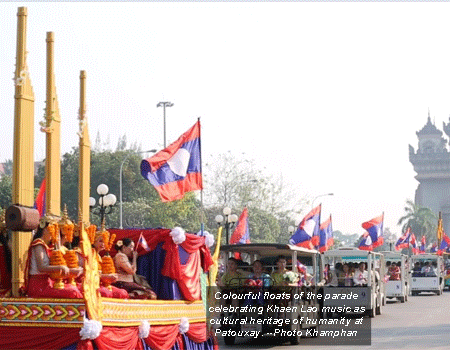Khaen music of the Lao people celebrated as humanity’s heritage

Hundreds of officials, foreign guests, musicians, performers and Vientiane residents gathered last night in Vientiane celebrating the international recognition of Khaen music of the Lao people as humanity’s heritage.
Prime Minister Thongloun Sisoulith, Deputy Prime Minister Sonexay Siphandone, and Minister of Information, Culture and Tourism, Prof Dr Bosengkham Vongdara joined the audience at the official celebration ceremony held yesterday evening at the National Culture Hall.
In his address at the ceremony, Dr Bosengkham told participants that the recognition of the Khaen music of the Lao people as Intangible Cultural Heritage of Humanity by the United Nations Educational, Scientific and Cultural Organisation (Unesco) was very meaningful for the nation.
“The Khaen music has been valuable heritage of the Lao people since ancient times. The Khaen music has imbued the lives of Lao people in all parts and provinces across the country,” he said.
The co-existence between the lifestyle of the Lao people and Khaen music has been described through a saying that goes ‘Wherever there is a Khaen music, there are Lao people there’, the minister said.
There is also a saying that goes ‘Whoever lives in a stilted house, eating sticky rice and playing the Khaen music are Lao people’, Dr Bosengkham added.
The Party and government have a policy in place to preserve and promote the musical culture of the nation, he said.
Khaen musicians from provinces across the country were invited to perform through several different shows to the admiration of the audience at the National Culture Hall.
The shows also featured Khaen music performances by foreign artists.
Earlier yesterday morning, a grand parade was organised to mark the recognition of Khaen music as humanity’s heritage.
Some 20 decorated trucks, buses and minibuses carrying at least 344 officials, musicians, performers, acrobats and invited guests joined the parade, which started at the Chao Fa Ngum Monument proceeding on main roads in the capital.
They were from 10 organisations, including the National Art School, National Performing Art Troupe, as well as musicians from the provinces.

Paying tribute to King Chao Fa Ngum, who united the Lao Lanxang Kingdom (current Lao PDR), Director General of the Heritage Department, Thongbai Phothisanere, representing those assembled, expressed pride over the recognition of Khaen music.
“On this auspicious occasion here at the sacred monument, we promise to you His Royal Highness, and other Lao ancestors that we will preserve and promote Lao Khaen Music –Laos’ and the world’s heritage,” the director said.
The parade carrying the certificate of recognition by Unesco and huge Khaen musical instruments moved along Souphanouvong Avenue to Setthathirath Road, Lane Xang Avenue, and 23 Singha Road. Khaen music, puppet and other art performances were presented during the parade.
The procession stopped at the Unknown Soldier Monument near That Luang Grand Stupa to salute past warriors and the Lao multiethnic people who sacrificed their lives for the nation.
The parade proceeded on to Kaysone Phomvihane Avenue and the President Kaysone Phomvihane Museum to pay tribute to the late President - one of the founding members of the Lao PDR.
Lao people and musicians said they were proud to have learnt that Khaen music was inscribed as humanity’s heritage by Unesco.
“I am very happy to know that Lao Khaen music was certified as world heritage,” said a Khaen musician from southern Attapeu province, Mr Saikham Sayasim.
In his late fifties, Mr Saikham, who was one of Khaen musicians from the province selected to join yesterday’s celebration, said he fell in love with Khaen music and has played it since he was 16.
“I want younger generations to play and preserve Khaen music,” he said.
Khaen music has been played with a number of folk songs from many parts of the country. These include Khubxamneau (Xam Neau folk song) sung by people in Xamneau district of northern Huaphan province, Khub Phuan folk song sung by people in northern Xieng Khuang province, Khub Ngum of Vientiane province, Lam Sa La Vanh of southern Saravan province and Lam Siphan Don of southern Champassak province.
The recognition of Khaen music was made at the twelfth session of the Intergovernmental Committee for the Safeguarding of the Intangible Cultural Heritage which took place in Jeju Island, Republic of Korea, from December 4-9, 2017.
Following the recognition, Unesco presented the certificate of the Khaen music of the Lao people as an ‘Intangible Cultural Heritage of Humanity’ to the Lao government last month.